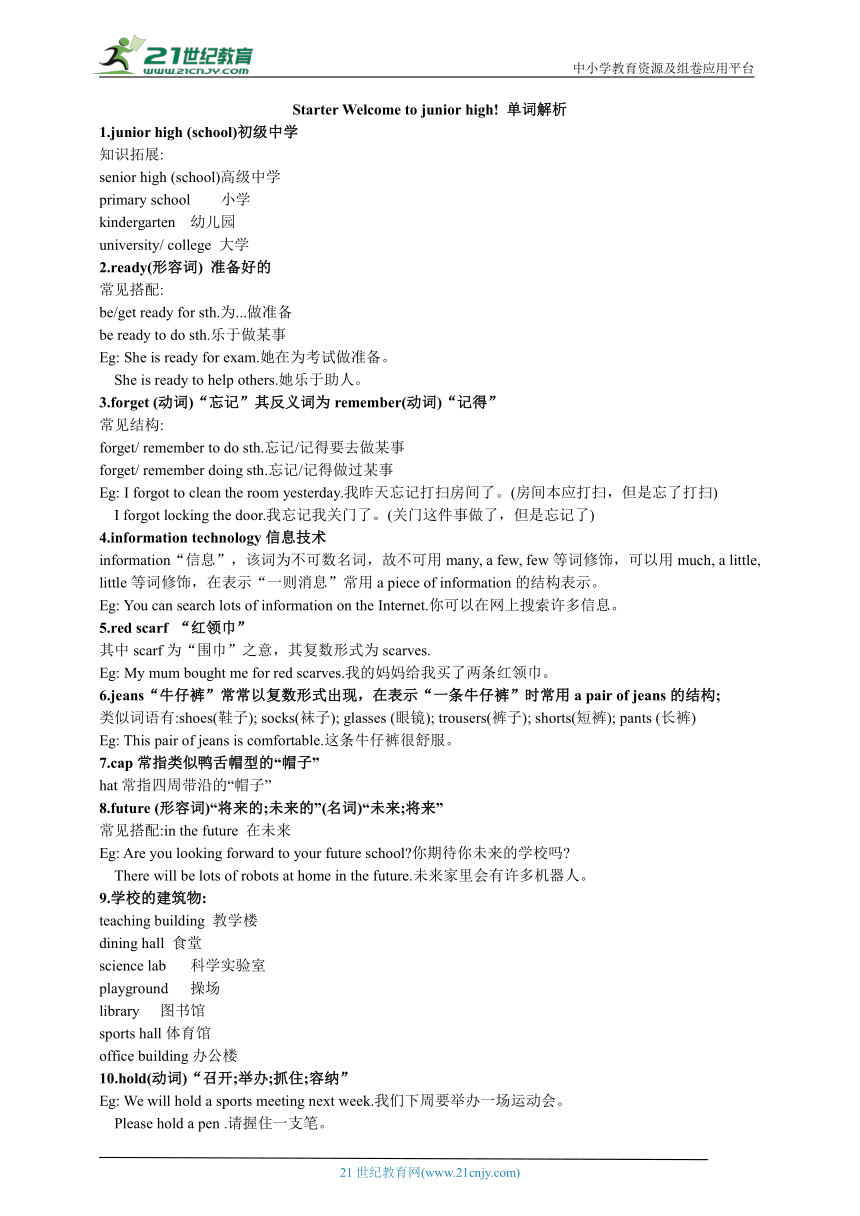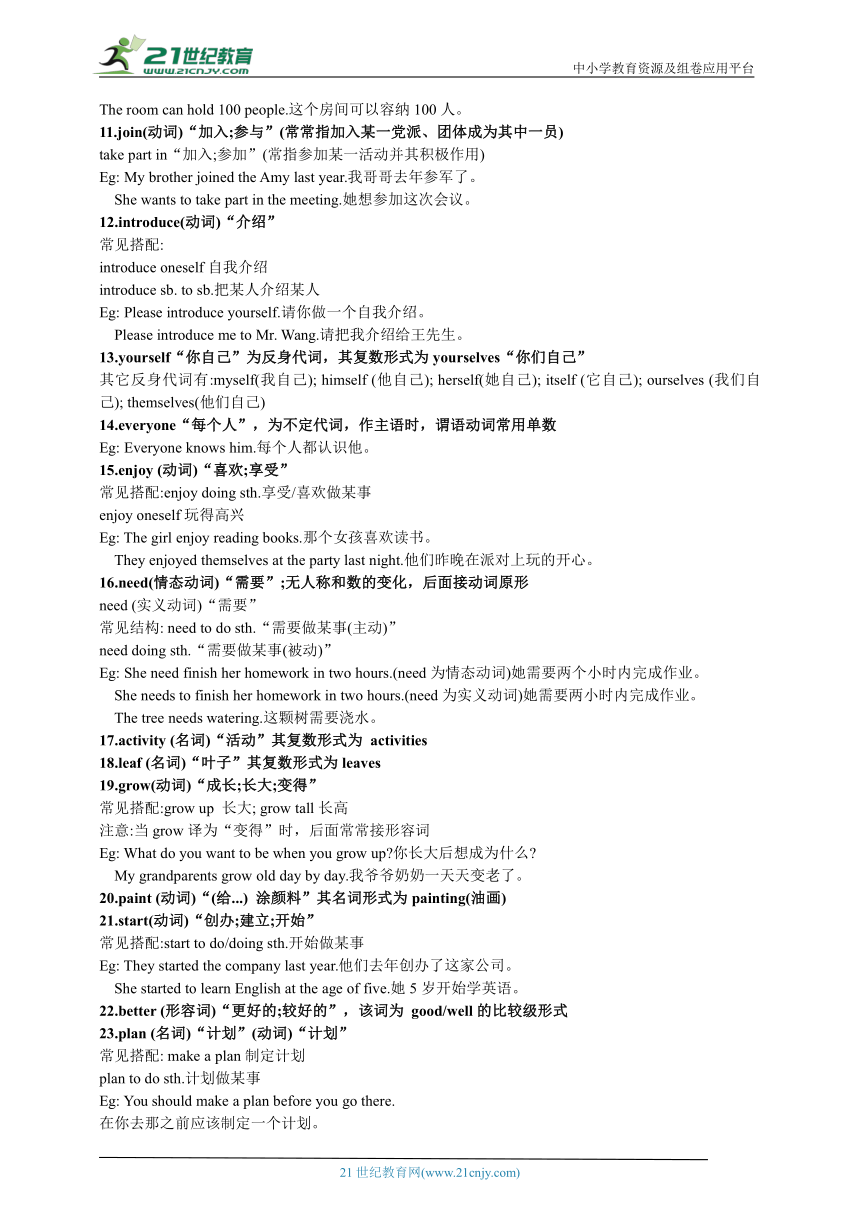Starter Welcome to junior high! 单词解析学案(外研版2024七上英语)
文档属性
| 名称 | Starter Welcome to junior high! 单词解析学案(外研版2024七上英语) |  | |
| 格式 | doc | ||
| 文件大小 | 395.7KB | ||
| 资源类型 | 试卷 | ||
| 版本资源 | 外研版 | ||
| 科目 | 英语 | ||
| 更新时间 | 2024-07-25 09:05:24 | ||
图片预览


文档简介
中小学教育资源及组卷应用平台
Starter Welcome to junior high! 单词解析
1.junior high (school)初级中学
知识拓展:
senior high (school)高级中学
primary school 小学
kindergarten 幼儿园
university/ college 大学
2.ready(形容词) 准备好的
常见搭配:
be/get ready for sth.为...做准备
be ready to do sth.乐于做某事
Eg: She is ready for exam.她在为考试做准备。
She is ready to help others.她乐于助人。
3.forget (动词)“忘记”其反义词为remember(动词)“记得”
常见结构:
forget/ remember to do sth.忘记/记得要去做某事
forget/ remember doing sth.忘记/记得做过某事
Eg: I forgot to clean the room yesterday.我昨天忘记打扫房间了。(房间本应打扫,但是忘了打扫)
I forgot locking the door.我忘记我关门了。(关门这件事做了,但是忘记了)
4.information technology信息技术
information“信息”,该词为不可数名词,故不可用many, a few, few等词修饰,可以用much, a little, little等词修饰,在表示“一则消息”常用a piece of information的结构表示。
Eg: You can search lots of information on the Internet.你可以在网上搜索许多信息。
5.red scarf “红领巾”
其中scarf为“围巾”之意,其复数形式为scarves.
Eg: My mum bought me for red scarves.我的妈妈给我买了两条红领巾。
6.jeans“牛仔裤”常常以复数形式出现,在表示“一条牛仔裤”时常用a pair of jeans的结构;
类似词语有:shoes(鞋子); socks(袜子); glasses (眼镜); trousers(裤子); shorts(短裤); pants (长裤)
Eg: This pair of jeans is comfortable.这条牛仔裤很舒服。
7.cap常指类似鸭舌帽型的“帽子”
hat常指四周带沿的“帽子”
8.future (形容词)“将来的;未来的”(名词)“未来;将来”
常见搭配:in the future 在未来
Eg: Are you looking forward to your future school 你期待你未来的学校吗
There will be lots of robots at home in the future.未来家里会有许多机器人。
9.学校的建筑物:
teaching building 教学楼
dining hall 食堂
science lab 科学实验室
playground 操场
library 图书馆
sports hall体育馆
office building办公楼
10.hold(动词)“召开;举办;抓住;容纳”
Eg: We will hold a sports meeting next week.我们下周要举办一场运动会。
Please hold a pen .请握住一支笔。
The room can hold 100 people.这个房间可以容纳100人。
11.join(动词)“加入;参与”(常常指加入某一党派、团体成为其中一员)
take part in“加入;参加”(常指参加某一活动并其积极作用)
Eg: My brother joined the Amy last year.我哥哥去年参军了。
She wants to take part in the meeting.她想参加这次会议。
12.introduce(动词)“介绍”
常见搭配:
introduce oneself自我介绍
introduce sb. to sb.把某人介绍某人
Eg: Please introduce yourself.请你做一个自我介绍。
Please introduce me to Mr. Wang.请把我介绍给王先生。
13.yourself“你自己”为反身代词,其复数形式为yourselves“你们自己”
其它反身代词有:myself(我自己); himself (他自己); herself(她自己); itself (它自己); ourselves (我们自己); themselves(他们自己)
14.everyone“每个人”,为不定代词,作主语时,谓语动词常用单数
Eg: Everyone knows him.每个人都认识他。
15.enjoy (动词)“喜欢;享受”
常见搭配:enjoy doing sth.享受/喜欢做某事
enjoy oneself玩得高兴
Eg: The girl enjoy reading books.那个女孩喜欢读书。
They enjoyed themselves at the party last night.他们昨晚在派对上玩的开心。
16.need(情态动词)“需要”;无人称和数的变化,后面接动词原形
need (实义动词)“需要”
常见结构: need to do sth.“需要做某事(主动)”
need doing sth.“需要做某事(被动)”
Eg: She need finish her homework in two hours.(need为情态动词)她需要两个小时内完成作业。
She needs to finish her homework in two hours.(need为实义动词)她需要两小时内完成作业。
The tree needs watering.这颗树需要浇水。
17.activity (名词)“活动”其复数形式为 activities
18.leaf (名词)“叶子”其复数形式为leaves
19.grow(动词)“成长;长大;变得”
常见搭配:grow up 长大; grow tall长高
注意:当grow译为“变得”时,后面常常接形容词
Eg: What do you want to be when you grow up 你长大后想成为什么
My grandparents grow old day by day.我爷爷奶奶一天天变老了。
20.paint (动词)“(给...) 涂颜料”其名词形式为painting(油画)
21.start(动词)“创办;建立;开始”
常见搭配:start to do/doing sth.开始做某事
Eg: They started the company last year.他们去年创办了这家公司。
She started to learn English at the age of five.她5岁开始学英语。
22.better (形容词)“更好的;较好的”,该词为 good/well的比较级形式
23.plan (名词)“计划”(动词)“计划”
常见搭配: make a plan制定计划
plan to do sth.计划做某事
Eg: You should make a plan before you go there.
在你去那之前应该制定一个计划。
They plan to have a holiday in Beijing.他们计划在北京度假。
21世纪教育网 www.21cnjy.com 精品试卷·第 2 页 (共 2 页)
HYPERLINK "http://21世纪教育网(www.21cnjy.com)
" 21世纪教育网(www.21cnjy.com)
Starter Welcome to junior high! 单词解析
1.junior high (school)初级中学
知识拓展:
senior high (school)高级中学
primary school 小学
kindergarten 幼儿园
university/ college 大学
2.ready(形容词) 准备好的
常见搭配:
be/get ready for sth.为...做准备
be ready to do sth.乐于做某事
Eg: She is ready for exam.她在为考试做准备。
She is ready to help others.她乐于助人。
3.forget (动词)“忘记”其反义词为remember(动词)“记得”
常见结构:
forget/ remember to do sth.忘记/记得要去做某事
forget/ remember doing sth.忘记/记得做过某事
Eg: I forgot to clean the room yesterday.我昨天忘记打扫房间了。(房间本应打扫,但是忘了打扫)
I forgot locking the door.我忘记我关门了。(关门这件事做了,但是忘记了)
4.information technology信息技术
information“信息”,该词为不可数名词,故不可用many, a few, few等词修饰,可以用much, a little, little等词修饰,在表示“一则消息”常用a piece of information的结构表示。
Eg: You can search lots of information on the Internet.你可以在网上搜索许多信息。
5.red scarf “红领巾”
其中scarf为“围巾”之意,其复数形式为scarves.
Eg: My mum bought me for red scarves.我的妈妈给我买了两条红领巾。
6.jeans“牛仔裤”常常以复数形式出现,在表示“一条牛仔裤”时常用a pair of jeans的结构;
类似词语有:shoes(鞋子); socks(袜子); glasses (眼镜); trousers(裤子); shorts(短裤); pants (长裤)
Eg: This pair of jeans is comfortable.这条牛仔裤很舒服。
7.cap常指类似鸭舌帽型的“帽子”
hat常指四周带沿的“帽子”
8.future (形容词)“将来的;未来的”(名词)“未来;将来”
常见搭配:in the future 在未来
Eg: Are you looking forward to your future school 你期待你未来的学校吗
There will be lots of robots at home in the future.未来家里会有许多机器人。
9.学校的建筑物:
teaching building 教学楼
dining hall 食堂
science lab 科学实验室
playground 操场
library 图书馆
sports hall体育馆
office building办公楼
10.hold(动词)“召开;举办;抓住;容纳”
Eg: We will hold a sports meeting next week.我们下周要举办一场运动会。
Please hold a pen .请握住一支笔。
The room can hold 100 people.这个房间可以容纳100人。
11.join(动词)“加入;参与”(常常指加入某一党派、团体成为其中一员)
take part in“加入;参加”(常指参加某一活动并其积极作用)
Eg: My brother joined the Amy last year.我哥哥去年参军了。
She wants to take part in the meeting.她想参加这次会议。
12.introduce(动词)“介绍”
常见搭配:
introduce oneself自我介绍
introduce sb. to sb.把某人介绍某人
Eg: Please introduce yourself.请你做一个自我介绍。
Please introduce me to Mr. Wang.请把我介绍给王先生。
13.yourself“你自己”为反身代词,其复数形式为yourselves“你们自己”
其它反身代词有:myself(我自己); himself (他自己); herself(她自己); itself (它自己); ourselves (我们自己); themselves(他们自己)
14.everyone“每个人”,为不定代词,作主语时,谓语动词常用单数
Eg: Everyone knows him.每个人都认识他。
15.enjoy (动词)“喜欢;享受”
常见搭配:enjoy doing sth.享受/喜欢做某事
enjoy oneself玩得高兴
Eg: The girl enjoy reading books.那个女孩喜欢读书。
They enjoyed themselves at the party last night.他们昨晚在派对上玩的开心。
16.need(情态动词)“需要”;无人称和数的变化,后面接动词原形
need (实义动词)“需要”
常见结构: need to do sth.“需要做某事(主动)”
need doing sth.“需要做某事(被动)”
Eg: She need finish her homework in two hours.(need为情态动词)她需要两个小时内完成作业。
She needs to finish her homework in two hours.(need为实义动词)她需要两小时内完成作业。
The tree needs watering.这颗树需要浇水。
17.activity (名词)“活动”其复数形式为 activities
18.leaf (名词)“叶子”其复数形式为leaves
19.grow(动词)“成长;长大;变得”
常见搭配:grow up 长大; grow tall长高
注意:当grow译为“变得”时,后面常常接形容词
Eg: What do you want to be when you grow up 你长大后想成为什么
My grandparents grow old day by day.我爷爷奶奶一天天变老了。
20.paint (动词)“(给...) 涂颜料”其名词形式为painting(油画)
21.start(动词)“创办;建立;开始”
常见搭配:start to do/doing sth.开始做某事
Eg: They started the company last year.他们去年创办了这家公司。
She started to learn English at the age of five.她5岁开始学英语。
22.better (形容词)“更好的;较好的”,该词为 good/well的比较级形式
23.plan (名词)“计划”(动词)“计划”
常见搭配: make a plan制定计划
plan to do sth.计划做某事
Eg: You should make a plan before you go there.
在你去那之前应该制定一个计划。
They plan to have a holiday in Beijing.他们计划在北京度假。
21世纪教育网 www.21cnjy.com 精品试卷·第 2 页 (共 2 页)
HYPERLINK "http://21世纪教育网(www.21cnjy.com)
" 21世纪教育网(www.21cnjy.com)
同课章节目录
